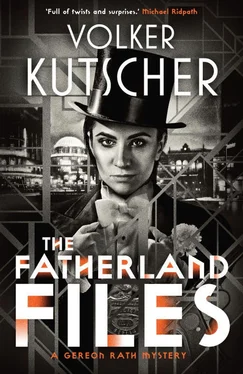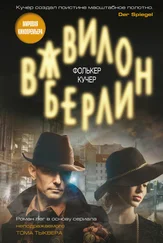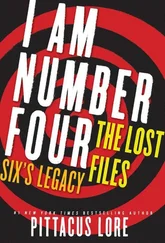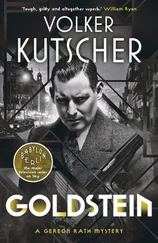Volker Kutscher
THE FATHERLAND FILES
‘The year 1932 will be our year, the year the Republic emerges victorious over its opponents. Not one more day, not one more hour, will we remain on the defensive – we attack! Across the board! We must be part of the general offensive. Today we cry – tomorrow we strike!’
Karl Höltermann, SPD, December 1931
Sunday, 11th July 1920
On the move again, stealing through the forest, he leaves his shelter and advances through the trees. No one will hear him, no one will see him. There is a heaviness in the air, deep in the thicket he feels the warmth; summer has arrived with a vengeance. Tokala pauses and takes a deep breath. The scent of lime-tree blossom and winter barley fills the air in the fields over by Markowsken, and already he can smell the lake.
As he draws nearer his pace slows. If he shows himself then it is only to strike fear into those around. He doesn’t like it when they enter his forest, doesn’t care for their loud cries, their reckless tramping through the undergrowth. He doesn’t like their contempt for everything he holds dear.
A mirror hangs in his hut and, sometimes, before he ventures out, he rubs black earth into his face until his eyes glow wildly and, when he bares his teeth, he resembles a beast of prey. In the twilight it renders him as good as invisible but, with the sun high, he has chosen to dispense with his disguise. To be all the stealthier, he wears moccasins made of elk leather and in them he prowls quiet as a cat.
Tokala must be careful. The lake belongs to their realm. People don’t dare enter his forest. They are afraid – afraid of the moors, and the Kaubuk.
Yes, the Kaubuk, they call him. They have long since forgotten his old name, which he can barely remember himself, and still less are they aware of his new one, which he adopted when he bade farewell to their world, many winters ago. His true name, his warrior name: Tokala, the fox.
Like a fox he moves through the forest, taking cover in his den. They let him go about his business in peace, and he reciprocates in kind. Neither meddles in the other’s world, their unspoken agreement for years. It is dangerous in their world, but now and again he must risk it, must venture into their cities and villages by night when he needs new books or paraffin oil – or crops that refuse to grow on his patch of moorland.
His caution is justified. He has almost reached the lake when he hears humming and singing, and pauses mid-motion to listen. A woman’s voice, an indeterminate melody. Slowly he steals towards his hiding place on the shore. Tokala has recognised her, has identified her voice, even before he sees her summer dress shimmering red and white through the trees.
Niyaha Luta, he calls her.
He has seen her once before, by the same spot a few weeks ago, and on that occasion, too, he crouched in hiding not daring to move. Though invisible in the dim of the thick undergrowth, she seemed to be looking straight at him when she gazed up from her book. The clatter and tinkle of metal told him she hadn’t stolen away alone, and, indeed, shortly afterwards, a man with a bicycle emerged from the forest. It was clear that she had been expecting him when she kissed him. It was she who kissed him, not the other way round, and thus Tokala knew this was neither their first meeting nor some chance encounter.
That was the moment he withdrew from his hiding place into the darkness of the forest.
Now she has returned, and Tokala is crouching in his hiding place once more. He sees her dress, a red, feather-like pattern on radiant white; sees her bare legs dangling in the water. She is sitting on that same sunlit branch jutting out over the lake and, just as before, she is reading from her book.
There is a crackle of branches, and a man emerges from the forest. Not the man with the bicycle, but another, and Tokala sees in her eyes that his presence is unexpected. She snaps her book shut as if she has been caught doing something illegal.
‘So this is where you’ve been idling,’ the man says.
‘I’m not idling, I’m reading.’
‘Here, in the wilds? When the whole region has come to perform its patriotic duty, even the peasants from Jewarken and Urbanken?’
These days there is much talk of patriotic duty and the Fatherland. Tokala doesn’t understand such talk, or why men in uniform chase him when he brings back bottles of paraffin oil from Suwalki or salt in exchange for his pelts. It makes no difference to him, Tokala, whether he is in the Markowsken forest or Karassewo, yet they behave as though it were the difference between heaven and hell. He has never understood the meaning of the border. The forest is the same, on both sides, and Tokala will never understand why one tree should be Prussian and the next should be Polish.
There is a splash as the man wades into the shallow shore water, and makes for Niyaha Luta.
‘What are you doing so far out in the forest? Aren’t you afraid you might wander onto the moors? Or into the Kaubuk’s hands?’
‘I’m not a child any more. Stories like that don’t scare me.’
‘Indeed you are not.’ Tokala doesn’t like the way he looks at her. ‘You’re a grown woman. You can even vote .’
‘I already did, straight after church. If that’s what you’re worried about?’
She means to sound brave, but Tokala can sense the tremble in her voice.
‘What I’m worried about…’ He gives a contemptuous snort. ‘And afterwards you had nothing better to do than ride out here…’
Fearfully, she looks around. As if the man with the bicycle could appear at any moment. Tokala crouches in his hiding place, sharing her concern.
‘Is it because of that red handkerchief hanging from the rail of the town mill bridge?’ She says nothing, but the man moves closer, reaching the branch on which she is sitting and gesturing towards the bark. ‘Someone’s carved a heart here,’ he says.
‘Oh, have they now?’ She sounds more spirited, but it is her desperation talking.
‘A.M.,’ he says, picking at the wood with his fingers. ‘And next to it J.P. Freshly carved.’ She says nothing, but Tokala can see the fear in her eyes. ‘A.M.? Sounds a lot like you, my dear.’ His index finger traces the letters in the bark. ‘But who is J.P.?’
Tokala sees her fear gradually morph into rage. ‘What are you trying to say?’
‘That you’ve bagged yourself a suitor. Well, here’s what I think about that!’
The man is screaming now. Tokala covers his ears with his hands, but the noise pierces the air.
‘I never promised you anything!’ She has jumped down from the branch and is standing with her bare feet in the shallow water, glaring at him furiously.
‘Is that right?’ he said, ‘but you have promised the Polack something, is that what you’re saying?’
‘That’s none of your goddamn business!’
‘People are already talking about you! You’re not even eighteen and here you are carrying on with this Pole, making doe-eyes at him!’
‘I never promised you anything, and never, do you hear me, never, would I let a man like you anywhere near me!’
The man lurches backwards, as if physically pained by her words. As if she has dealt him a blow with a stick. Then he steadies himself, speaking softly now. ‘But you let him do whatever he likes. The Polack!’
‘He isn’t Polish, he’s Prussian. Just like you.’
Читать дальше













